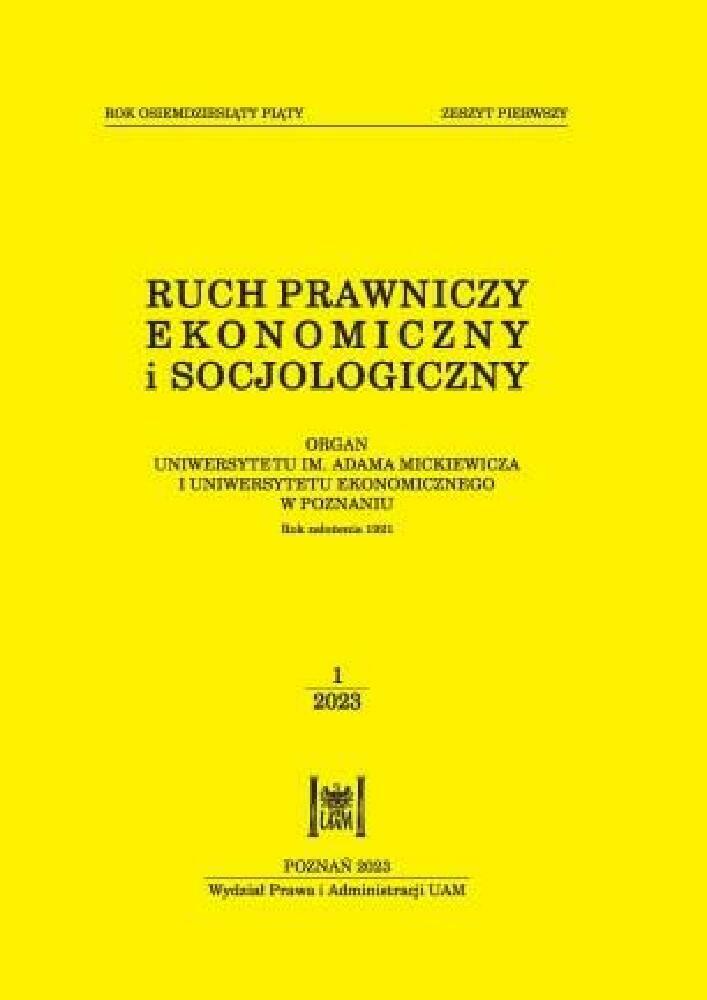Abstrakt
Recent events in the world economy, such as the pandemic and the war in Ukraine, have special implications for the countries that are part of the most advanced integration group in the world – the European Union (EU). In order to face new challenges, the EU must constantly evolve, because leaving the structure unchanged could mean stagnation and collapse. The paper aims to assess the functioning of the European Union in the conditions of the new ‘post-pandemic’ reality and the consequences of the war in Ukraine, and to review the prospects for further integration. The paper uses a diagnostic approach that involves establishing the actual state of affairs, assessing it, and considering the possibility of its improvement. As a result of the considerations undertaken, it can be assumed that the stability (and even the survival) of the EU seem to be favoured more by integration initiatives referring to the neo-functional theory and federal approach rather than the confederal approach. It is justified to increase the role of the political spill-over effect and the assumptions of heterodox economics. Historical experience leads to the conclusion that failure to take appropriate initiatives may trigger the disintegration mechanism and, consequently, the collapse of the European integration project.
Bibliografia
Banaszyk, P., Gorynia, M. (2022). Uwarunkowania polskiej polityki gospodarczej po roku 2022. Ruch Prawniczy, Ekonomiczny i Socjologiczny 84(2): 149–161. DOI: https://doi.org/10.14746/rpeis.2022.84.2.10
Bartoszewicz, A. (2016). Wielopoziomowe zarządzanie publiczne w Unii Europejskiej. In J. Stacewicz Horodecka, A. (2017). Polityka gospodarcza w świetle przemian współczesnej myśli ekonomicznej. In J. Stacewicz (ed.), Perspektywy polityki gospodarczej (pp. 211–238). Warsaw: Szkoła Główna Handlowa w Warszawie.
Jörke, D., Sonnicksen, J. (2020). Towards an antifederalist theory of the EU: democratic federal lessons for the European Union. Journal of Common Market Studies 58(2): 217–234. DOI: https://doi.org/10.1111/jcms.12899
Kawalec, M. (2017). Wpływ kryzysu finansowego na możliwość wprowadzenia federalizmu fiskalnego w strefie euro. Zeszyty Naukowe Uniwersytetu Ekonomicznego w Krakowie 9(969): 33–48. DOI: https://doi.org/10.15678/ZNUEK.2017.0969.0903
Keil, S., Alber, E. (2020). Introduction: federalism as a tool of conflict resolution. Ethnopolitics 19(4): 329–341. DOI: https://doi.org/10.1080/17449057.2020.1795469
Kołodko, G. (2020). Od ekonomicznej teorii do politycznej praktyki. Warsaw: Poltext.
Kotliński, K. (2012). Rola koncepcji integracji politycznej i gospodarczej w procesie integracji europejskiej. Szkice Humanistyczne 28: 119–132.
Kubin, T. (2007). Polityczne implikacje wprowadzenia unii walutowej w Europie. Katowice: Wyd. Uniwersytetu Śląskiego.
Nitsch, V. (2004). Have a break, have a … national currency: when do monetary unions fall apart? CESIfo WP, 1113, January. DOI: https://doi.org/10.2139/ssrn.496002
O’Leary, B. (2020). The nature of the European Union. In F. Duina, F. Merand (eds.), Europe’s Malaise (Research in Political Sociology) (pp. 17–44). Bingley: Emerald Publishing Limited.
Södersten, A. (2023). Rule of law crisis: EU in limbo between federalism and flexible integration. In A.B. Engelbrekt, P. Ekman, A. Michalski, L. Oxelheim (eds.), The EU between Federal Union and Flexible Integration (pp. 51–73). Cham: Palgrave Macmillan. DOI: https://doi.org/10.1007/978-3-031-22397-6_3
Tabellini, G. (2016). Building Common Fiscal Policy in the Eurozone. In R. Baldwin, F. Giavazzi (eds.), How to Fix Europe’s Monetary Union: Views of Leading Economists (pp. 119–131). London: CEPR Press.
Tendera-Właszczuk, H. (2015). Przyszłość integracji w świetle analizy źródeł kryzysu idei europejskiej. Annales Universitatis Mariae Curie-Skłodowska, sectio H – Oeconomia 49(2): 205–213. DOI: https://doi.org/10.17951/h.2015.49.2.205
Ubide, A. (2015). Stability bonds for the euro area. Policy Briefs PB15-19, Peterson International Institute for International Economics: 1–9.
Valiante, D. (2011). The eurozone debt crisis: from its origins to a way forward. CEPS Policy Brief 251: 1–12. DOI: https://doi.org/10.2139/ssrn.1928697
Wessels, W. (1997). An ever closer fusion? A dynamic macropolitical view on integration processes. Journal of Common Market Studies 35(2): 267–299. DOI: https://doi.org/10.1111/1468-5965.00060
Zielińska-Głębocka, A. (1999). Dynamika Unii Europejskiej w świetle teorii integracji. Studia Europejskie 3: 11–32.(ed.), Polityka gospodarcza w warunkach przemian rozwojowych (pp. 111–129). Warsaw: Szkoła Główna Handlowa w Warszawie.
Bénassy-Quéré, A., Ragot X., Wolff G.B. (2016). Which fiscal union for the euro area? Conseil d’analyse economique 29(2): 1–12. DOI: https://doi.org/10.3917/ncae.029.0001
Borowiec, J. (2011). Ekonomia integracji europejskiej. Wrocław: Wyd. Uniwersytetu Ekonomicznego we Wrocławiu.
Delpla, J., von Weizsäcker, J. (2011). Eurobonds: the blue bond concept and its implications. Bruegel Policy Contribution 2.
Dunin-Wąsowicz, M., Darska, A., Tchorek, G. (2012). Integracja europejska i nowy ład gospodarczy. Warsaw: Scholar.
European Commission (2021). One year since the outbreak of COVID-19: fiscal policy response. Communication from the Commission to The Council. COM(2021) 105 final, 3.3.2021. Brussels.
European Commission (2022). Fiscal policy guidance for 2023. Communication from the Commission to the Council. COM(2022) 85 final, 02.03.2022. Brussels.
Galbraith, J.K. (2016). Welcome to the Poisoned Chalice: The Destruction of Greece and the Future of Europe. New Haven, London: Yale University Press.
Heidbreder, E.G. (2022). Federalism in the European Union. In S. Keil, S. Kropp (eds.), Emerging Federal Structures in the Post-Cold War Era: Federalism and Internal Conflicts (pp. 277–299). Cham: Palgrave Macmillan. DOI: https://doi.org/10.1007/978-3-030-93669-3_13
Licencja
Prawa autorskie (c) 2023 WPiA UAM

Utwór dostępny jest na licencji Creative Commons Uznanie autorstwa 4.0 Międzynarodowe.





